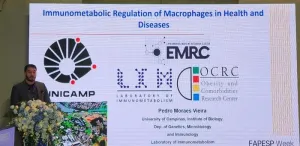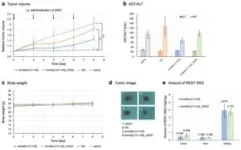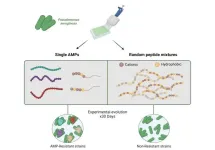(Press-News.org) Already at the beginning of the COVID-19 pandemic, a group of Brazilian researchers pioneered in showing why SARS-CoV-2 infection tends to be more severe in diabetic patients. Now, the same team based at the Institute of Biology of the State University of Campinas (IB-UNICAMP) has discovered one of the reasons why obese people who do not have diabetes or even insulin resistance also have an increased risk of developing the severe form of the disease.
“New experiments show that the molecular mechanisms are quite different in the two cases,” Pedro Moraes-Vieira, a professor at IB-UNICAMP, who is coordinating the research, told Agência FAPESP.
The research is supported by two projects (20/16030-0 and 20/04579-7) and is also linked to the Obesity and Comorbidities Research Center (OCRC) – a FAPESP Research, Innovation and Dissemination Center (RIDC) based at UNICAMP.
The data were presented on June 30 at a panel discussion on health and biomedicine as part of the FAPESP Week China program.
In an article published in May 2020, the UNICAMP group showed that in diabetics infected with SARS-CoV-2, the higher glucose content in the blood is picked up by a type of defense cell known as monocytes and serves as an extra source of energy that allows the virus to replicate more than in a healthy organism. In response to the growing viral load, the monocytes release large amounts of cytokines (inflammatory proteins), which cause a variety of effects, including the death of lung cells. The researchers also reported that in the lungs of patients with severe COVID-19, monocytes and macrophages were the most abundant cells. And that the so-called glycolytic pathway, which metabolizes glucose, was greatly increased in these leukocytes (read more at: agencia.fapesp.br/33296).
The latest study, the results of which should be published soon, shows that hyperinflammation in obese non-diabetics is linked to elevated blood levels of saturated fatty acids – particularly a type known as palmitate. Also known as palmitic acid, it is the main component of palm oil. It is found in beef, milk and its derivatives.
“Through in vitro experiments, we observed that palmitate promotes a pre-activation of innate immunity cells [the first to take action in the face of an infection]. They become alert, ready to respond more intensely if they detect a threat. When we infect these pre-activated cells with SARS-CoV-2, they produce a greatly increased amount of inflammatory cytokines,” explains Moraes-Vieira.
Impaired immunity
In previous work, the UNICAMP group had already observed that, in the context of COVID-19, this “cytokine storm” produced by monocytes and macrophages is the basis of two very undesirable phenomena: the death of lung epithelial cells and the dysfunction of the adaptive immune response – the one that kicks in about two weeks after infection and is related to the action of cells (mainly T lymphocytes) capable of recognizing and killing pathogens in a specific way.
“When we cultured the T cells in a medium conditioned by monocytes infected with SARS-CoV-2, we saw a lower proliferative capacity, reduced secretion of inflammatory cytokines, and increased expression of a protein called PD-1, whose role is to signal to the T lymphocytes when it is time to stop responding to the infection. The idea is that this signaling occurs after a while so that there is no exacerbated immune response. In the context of severe COVID-19, however, PD-1 causes T lymphocytes to stop working even before the disease is resolved, leading to a process called exhaustion, which is common in T cells found in tumors, for example, and is associated with a worse prognosis,” the researcher explains.
“These findings help us understand why non-diabetic obese people are also more likely to develop severe COVID. Of course, this is not the only factor. But we are adding another piece to the puzzle,” concludes Moraes-Vieira.
To find out more about FAPESP Week China, visit: fapesp.br/week/2024/china.
END
Study reveals new factor associated with the risk of severe COVID-19 in people with obesity
By analyzing samples from obese non-diabetics, researchers found that high blood levels of saturated fatty acids cause pre-activation of innate immune cells that, when infected with SARS-CoV-2, produce elevated levels of inflammatory molecules.
2024-07-02
ELSE PRESS RELEASES FROM THIS DATE:
Study finds that influential people can play a valuable role in getting people to act in the best interest of society
2024-07-02
Getting individuals to act in the best interest of society can be a tricky balancing act, one that often walks a fine line between trying to convince people to act of their own volition, versus passing laws and regulations that make these actions compulsory.
In a new paper, published in the journal PNAS Nexus, SFI External Professor Stefani Crabtree (Utah State University) and Science Board Fellow Simon Levin (Princeton University), together with Colin Wren (University of Colorado, Colorado Springs) and Avinash ...
Editorial: Genomics has more to reveal
2024-07-02
“If there was any doubt, this discovery demonstrates that genomics, extensively deployed over the past two decades, still has much to reveal to us.”
BUFFALO, NY- July 2, 2024 – A new editorial paper was published in Oncotarget's Volume 15 on June 20, 2024, entitled, “Genomics has more to reveal.”
In this new editorial, researchers Laurène Fenwarth and Nicolas Duployez from the University of Lille and CHU Lille discuss molecular and cytogenetic analyses that are now used to identify mutations and structural variants defining distinct subtypes of acute myeloid leukemias (AML) ...
COVID-19 pandemic tied to low birth weight for infants in India, study shows
2024-07-02
The incidence of low birth weight rose sharply in India amid the COVID-19 pandemic, according to new research from the University of Notre Dame.
Globally, 1 in 4 newborns has a low birth weight (less than 5.5 pounds), and the problem disproportionately affects low- and middle-income countries — particularly in South Asia, home to approximately one-fourth of the world’s population.
Santosh Kumar, associate professor of development and global health economics at Notre Dame’s Keough School of Global Affairs, co-authored the study published in Communications Medicine, a Nature series journal.
“This research shows that low birth weight became more common in India ...
Welch Foundation supports UTA’s drug delivery innovations
2024-07-02
With a $300,000 grant, the Welch Foundation is supporting University of Texas at Arlington research into creating new materials to safely and effectively deliver medications to treat diseases such as cancer.
Since its founding in 1954, the Houston-based Welch Foundation has contributed over $1.1 billion to the advancement of chemistry through research grants, departmental programs, endowed chairs and other special projects in Texas.
“As one of the nation’s largest private funding sources for chemical research, we are committed to supporting the field in a way that advances science while ...
Treatment with a mixture of antimicrobial peptides can impede antibiotic resistance
2024-07-02
A common infection-causing bacteria was much less likely to evolve antibiotic resistance when treated with a mixture of antimicrobial peptides rather than a single peptide, making these mixtures a viable strategy for developing new antibiotic treatments. Jens Rolff of the Freie Universitat Berlin, Germany, and colleagues report these findings in a new study publishing July 2nd in the open-access journal PLOS Biology.
Antibiotic-resistant bacteria have become a major threat to public health. The World Health Organization estimates ...
The Mediterranean Diet is linked to lower risk of mortality in cancer survivors
2024-07-02
The Mediterranean Diet is a powerful ally for health even after a cancer diagnosis. This is the key result of an Italian study carried out as part of the UMBERTO Project, conducted by the Joint Research Platform Umberto Veronesi Foundation - Department of Epidemiology and Prevention of the I.R.C.C.S. Neuromed of Pozzilli, in collaboration with the LUM "Giuseppe Degennaro" University of Casamassima (BA). According to this research, people diagnosed with any type of tumor, who had a high adherence to the Mediterranean Diet in the year preceding their enrollment into the study, live longer and have a reduced risk of cardiovascular mortality, ...
The International Biogeography Society relaunches flagship journal Frontiers of Biogeography on Pensoft’s ARPHA platform
2024-07-02
The International Biogeography Society (TIBS) has relaunched its flagship open-access scientific journal, Frontiers of Biogeography (FoB), on the ARPHA platform, where it will be co-published with Pensoft Publishers.
This collaboration underscores the society’s commitment to maintaining high-quality, high-visibility and low-cost open-access publishing for the biogeographical community.
"This switch of our journal to a cutting-edge platform, and its committed team of editors, should continue to raise the journal's ...
Binghamton University marks official launch of federally funded battery initiative
2024-07-02
BINGHAMTON, N.Y. -- National Science Foundation (NSF) officials joined Binghamton University, State University of New York to officially launch the Upstate New York Energy Storage Engine. After winning the designation earlier this year, Binghamton University and its New Energy New York and Engine coalition partners gathered to celebrate what this all means to the region.
At a press conference on Thursday, Binghamton University President Harvey Stenger welcomed NSF Assistant Director of the Technology, Innovation and Partnerships (TIP) Directorate Erwin Gianchandani to Binghamton to help launch the Engine program.
Erwin ...
Women of color disproportionately targeted by book bans, study finds
2024-07-02
In 2023, the American Library Association documented hundreds of attempts to remove more than 4,000 books from schools and libraries across nearly all states in the U.S.
In one of the first comprehensive analyses of book bans in the U.S., a University of Colorado Boulder researcher and her collaborators revealed that these bans disproportionally target women authors of color, and a large portion of the banned books feature characters of color.
The findings appeared June 11 in the journal ...
The American Society for Nutrition announces Orlando, Florida as the location for its annual flagship meeting, NUTRITION 2025
2024-07-02
The American Society for Nutrition (ASN) has announced that next year’s meeting is scheduled to be held May 31 – June 3, 2025, in Orlando, Florida. NUTRITION is the premier meeting for the nutrition community, exploring developments in clinical and translational nutrition, food science and systems, diet and disease, basic science, global health and more. In its seventh year, the event has continued to evolve and grow with innovative scientific sessions and networking opportunities for scientists, clinicians and healthcare professionals interested in ...
LAST 30 PRESS RELEASES:
Scientists show how to predict world’s deadly scorpion hotspots
ASU researchers to lead AAAS panel on water insecurity in the United States
ASU professor Anne Stone to present at AAAS Conference in Phoenix on ancient origins of modern disease
Proposals for exploring viruses and skin as the next experimental quantum frontiers share US$30,000 science award
ASU researchers showcase scalable tech solutions for older adults living alone with cognitive decline at AAAS 2026
Scientists identify smooth regional trends in fruit fly survival strategies
Antipathy toward snakes? Your parents likely talked you into that at an early age
Sylvester Cancer Tip Sheet for Feb. 2026
Online exposure to medical misinformation concentrated among older adults
Telehealth improves access to genetic services for adult survivors of childhood cancers
Outdated mortality benchmarks risk missing early signs of famine and delay recognizing mass starvation
Newly discovered bacterium converts carbon dioxide into chemicals using electricity
Flipping and reversing mini-proteins could improve disease treatment
Scientists reveal major hidden source of atmospheric nitrogen pollution in fragile lake basin
Biochar emerges as a powerful tool for soil carbon neutrality and climate mitigation
Tiny cell messengers show big promise for safer protein and gene delivery
AMS releases statement regarding the decision to rescind EPA’s 2009 Endangerment Finding
Parents’ alcohol and drug use influences their children’s consumption, research shows
Modular assembly of chiral nitrogen-bridged rings achieved by palladium-catalyzed diastereoselective and enantioselective cascade cyclization reactions
Promoting civic engagement
AMS Science Preview: Hurricane slowdown, school snow days
Deforestation in the Amazon raises the surface temperature by 3 °C during the dry season
Model more accurately maps the impact of frost on corn crops
How did humans develop sharp vision? Lab-grown retinas show likely answer
Sour grapes? Taste, experience of sour foods depends on individual consumer
At AAAS, professor Krystal Tsosie argues the future of science must be Indigenous-led
From the lab to the living room: Decoding Parkinson’s patients movements in the real world
Research advances in porous materials, as highlighted in the 2025 Nobel Prize in Chemistry
Sally C. Morton, executive vice president of ASU Knowledge Enterprise, presents a bold and practical framework for moving research from discovery to real-world impact
Biochemical parameters in patients with diabetic nephropathy versus individuals with diabetes alone, non-diabetic nephropathy, and healthy controls
[Press-News.org] Study reveals new factor associated with the risk of severe COVID-19 in people with obesityBy analyzing samples from obese non-diabetics, researchers found that high blood levels of saturated fatty acids cause pre-activation of innate immune cells that, when infected with SARS-CoV-2, produce elevated levels of inflammatory molecules.








